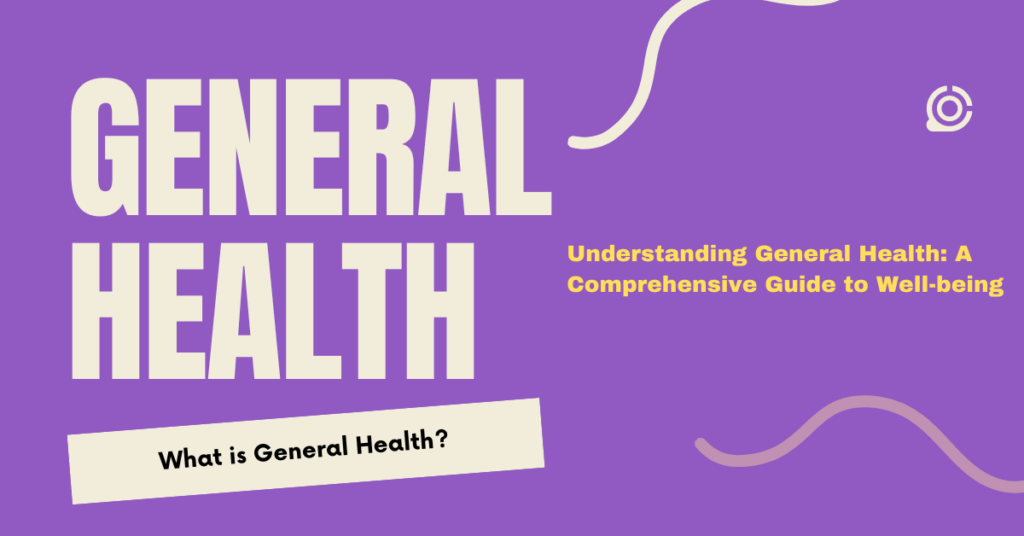General health is a broad concept that encompasses various aspects of physical, mental, and emotional well-being. Achieving and maintaining good general health involves a holistic approach, integrating a balanced lifestyle, preventive care, and mindful practices to promote overall wellness. This article explores the key components of general health, practical tips for maintaining it, and the importance of adopting a proactive approach to well-being.
What is General Health?
General health refers to the overall state of an individual’s physical, mental, and emotional condition. It is a reflection of how well the body and mind function together to maintain balance and resilience. Good general health is not merely the absence of disease but a state of complete physical, mental, and social well-being.
Key Components of General Health
- Physical Health: This involves the proper functioning of the body’s systems and the absence of physical ailments. Key elements of physical health include:
- Nutrition: Consuming a balanced diet rich in essential nutrients supports bodily functions and helps prevent chronic diseases.
- Exercise: Regular physical activity strengthens the cardiovascular system, maintains healthy weight, and improves overall fitness.
- Sleep: Quality sleep is crucial for physical recovery, cognitive function, and overall well-being.
- Preventive Care: Routine check-ups, screenings, and vaccinations help detect potential health issues early and prevent diseases.
- Mental Health: Mental health encompasses emotional and psychological well-being. It involves managing stress, maintaining a positive outlook, and addressing mental health challenges. Key aspects include:
- Stress Management: Techniques such as mindfulness, relaxation exercises, and time management can help manage stress effectively.
- Emotional Resilience: Building resilience involves developing coping skills, maintaining a positive outlook, and seeking support when needed.
- Mental Health Care: Professional counseling, therapy, and support services are essential for addressing mental health issues and promoting emotional well-being.
- Social Health: Social health refers to the quality of relationships and interactions with others. Healthy social connections contribute to a sense of belonging and support. Important aspects include:
- Healthy Relationships: Building and maintaining positive relationships with family, friends, and colleagues supports emotional well-being.
- Community Engagement: Participating in community activities and social events fosters a sense of connection and purpose.
- Communication Skills: Effective communication enhances relationships and helps resolve conflicts in a constructive manner.
Practical Tips for Maintaining General Health
- Adopt a Balanced Diet: Eat a variety of nutrient-dense foods, including fruits, vegetables, whole grains, lean proteins, and healthy fats. Avoid excessive consumption of processed foods, sugary drinks, and high-fat snacks.
- Exercise Regularly: Engage in at least 150 minutes of moderate aerobic activity or 75 minutes of vigorous activity per week, combined with muscle-strengthening exercises. Find activities you enjoy to stay motivated.
- Prioritize Sleep: Aim for 7-9 hours of quality sleep each night. Establish a regular sleep routine, create a comfortable sleep environment, and avoid stimulants before bedtime.
- Manage Stress: Incorporate stress-reducing practices into your daily routine, such as mindfulness meditation, deep breathing exercises, or yoga. Identify and address sources of stress proactively.
- Stay Hydrated: Drink plenty of water throughout the day to maintain hydration and support bodily functions. Aim for at least 8 cups (2 liters) of water daily, adjusting for individual needs and activity levels.
- Engage in Social Activities: Build and maintain strong social connections by spending time with loved ones, participating in group activities, and fostering meaningful relationships.
- Seek Regular Medical Care: Schedule routine check-ups with your healthcare provider, stay up-to-date with recommended screenings and vaccinations, and address health concerns promptly.
- Practice Self-Care: Take time for activities that bring you joy and relaxation, such as hobbies, reading, or spending time in nature. Self-care is essential for maintaining balance and preventing burnout.
Must Read :Key Components of General Health: A Comprehensive Guide to Holistic Well-being
The Importance of a Proactive Approach
Maintaining general health requires a proactive approach that integrates various aspects of well-being. By prioritizing physical, mental, and social health, individuals can build a strong foundation for overall wellness. Adopting healthy habits, seeking preventive care, and addressing health issues early contribute to a higher quality of life and long-term health benefits.
Conclusion
General health is a multifaceted concept that encompasses physical, mental, and social well-being. Achieving and maintaining good general health involves a holistic approach that integrates balanced nutrition, regular exercise, quality sleep, effective stress management, and meaningful social connections. By adopting proactive strategies and prioritizing overall wellness, individuals can enhance their quality of life, prevent chronic diseases, and build resilience to navigate life’s challenges. Embracing a comprehensive approach to general health not only supports a vibrant and fulfilling life but also empowers individuals to thrive and achieve their full potential.


![Understanding Leukemia: A Comprehensive Overview [2024]](https://newstechblog.com/wp-content/uploads/2024/08/cancerHealth-1-1024x536.png)
![Coughing up Phlegm: Causes, Symptoms, and Treatment [2024]](https://newstechblog.com/wp-content/uploads/2024/08/Coughing-up-Phlegm-Causes-Symptoms-and-Treatment-1024x614.jpg)